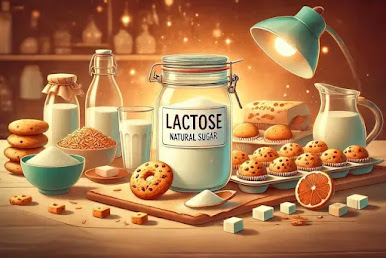Lactose is a natural component of milk that plays an important role in the food industry. In recent years, interest in it has increased due to its ability to serve as a natural sweetener. As the focus shifts toward healthy eating and reducing sugar intake, lactose has become a key ingredient in the creation of low-calorie products. In this article, we will explore how lactose is used in low-calorie food production and its benefits.
Lactose as a Natural Sweetener
Lactose, also known as "milk sugar," is a natural carbohydrate found in milk and dairy products. Compared to regular sugar (sucrose), it is less sweet but still has a positive impact on the flavor of foods. One of its key advantages is that lactose provides natural sweetness without excessive calories, making it highly sought after in the production of low-calorie and diet-friendly products.
One standout feature of lactose is its low glycemic index, making it an ideal choice for individuals looking to control their blood sugar levels. It is slowly absorbed by the body, helping to maintain stable energy levels throughout the day.
Benefits of Using Lactose
- Natural Flavor. Lactose adds a mild sweetness to foods without overpowering other flavors, allowing for the preservation of the natural taste of dishes and beverages.
- Low-Calorie Content. Lactose contains fewer calories compared to regular sugar, making it suitable for people who are watching their weight or looking to reduce sugar intake.
- Stability in Recipes. Lactose is stable at high temperatures, making it an ideal ingredient for use in baking, confectionery, and dairy products.
The Role of Lactose in Low-Calorie Food Production
Lactose is widely used in various food categories, from dairy products to baked goods. Its use helps lower the overall calorie content without compromising taste. For example, in the production of yogurt, cheese, and diet-friendly sweets, lactose not only acts as a sweetener but also as a texturizing agent, giving products the necessary consistency and creaminess.
Additionally, lactose is often used in baking. Thanks to its heat resistance, it retains its properties even at high temperatures. This makes it an excellent component for creating low-calorie bread, cookies, and cakes.
Lactose and Health
Lactose, being a natural carbohydrate, requires the enzyme lactase for its breakdown and subsequent absorption by the body. Lactase converts lactose into two simple sugars—glucose and galactose—which are then absorbed into the bloodstream. In childhood, this enzyme is produced actively, but some adults experience a reduction in lactase production, leading to difficulty digesting lactose—this is known as lactose intolerance. However, the myth that most people suffer from this condition is exaggerated. The percentage of people with lactase deficiency varies greatly across different regions of the world, and a significant portion of the population retains the ability to digest lactose throughout their lives.
Another myth is that lactose is harmful to health even in the absence of intolerance. In fact, lactose is not only safe for most people but also beneficial. As mentioned earlier, it enhances the absorption of calcium and magnesium, which are essential for bone and dental health. This is especially important for older adults looking to maintain bone density and prevent osteoporosis. Additionally, moderate lactose consumption can support a healthy gut microbiome, positively affecting the digestive system.
For those who are lactose intolerant, there are special low-lactose or lactose-free products that allow people to enjoy the taste of dairy without any unpleasant side effects.
Environmental and Economic Aspects
Lactose is not only a beneficial product but also an environmentally sustainable component. It is derived from milk, making it readily available and easy to process. In response to the growing demand for eco-friendly products and sustainable production, the use of lactose is becoming increasingly popular among manufacturers.
Moreover, lactose is economically advantageous for producers. It is used in small quantities but offers significant benefits in terms of texture, flavor, and calorie reduction. This allows the creation of high-quality products without the need for expensive artificial sweeteners or additives.
Final Thoughts
Lactose plays an important role in the production of low-calorie products. It is a natural sweetener that helps preserve the taste and texture of foods while reducing their calorie content. Thanks to its unique properties, lactose remains a sought-after component in the food industry and continues to gain popularity among manufacturers striving to offer consumers healthy and delicious products.
In the future, it is expected that lactose will be used even more widely, especially in the production of health-conscious foods for people looking to cut back on sugar. Thanks to its natural qualities and positive effects on health, lactose will continue to occupy an important place in the market for food ingredients.
